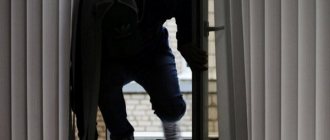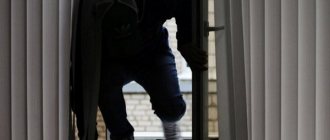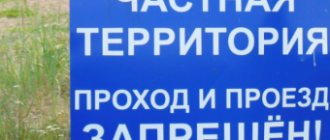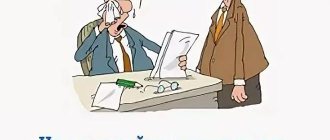Corpus delicti
The object is the right of citizens to their own real estate and the inviolability of their home, which is ensured by Article 25 and Article 35 of the Constitution of the Russian Federation, and the subject is the apartments and houses themselves, dachas, etc. They cannot be warehouses, any office premises, utility rooms, etc.
The subject of the offense is real estate.
The right to the inviolability of a home is recognized as the right to use or own property in the presence of appropriate documents (lease or rental agreements, certificate of ownership, etc.) confirming this, as well as the right of those persons who live there legally at the will of the owner himself.
For Part 1 and Part 2 of Article 139 of the Criminal Code of the Russian Federation, the subject is a legally competent person who has already crossed the age line of 16 years , and for Part 3 - also a person who has used his privileges at work.
Objective and subjective sides
The objective side is characterized as an active form of action by a person in the form of illegal entry into a home, without any right to do so. The way in which this is done is not particularly important.
It can be secret or open, in the presence of the owner himself or other persons, using technical or other means . If in this case deception was used on the part of the criminal, then there will be no corpus delicti, since he entered the residential premises with the permission of the victim, although he was in error.
The subjective side is expressed in the form of guilt - direct intent.
What is private territory?
There is no concept of “private territory” in Russian legislation, but this expression refers to real estate that is registered as the property of an individual or non-governmental organization. This role can be played by a residential apartment, a non-residential warehouse or basement in an apartment building, a plot of land, both with and without residential buildings, and so on.
Evidence of the legal authority of the owner is a certificate of ownership and other supporting documents. If we are talking about a land plot, its cadastral number must be assigned to a specific person. The presence of a fence is not necessary to prove its ownership by a given entity. But this fact is important for understanding the boundaries of the territory by participants in legal relations.
If the site is not surrounded by a fence or other type of fencing, and the owner has not indicated in any way his reluctance to see strangers on this territory, anyone can walk on the land. This action is not considered an offense.
The onset of a specific type of legal liability depends on the type of object whose boundaries have been violated. The right of ownership in the general legal sense is protected by Article 209 of the Civil Code of the Russian Federation.
Land allotment, as a subject of regulation, is discussed in Chapter 17 of this normative act. But the law says nothing about what to do in case of violation of the right to land. This is the main difficulty of the mechanism for implementing the protection of the victim.
The inviolability of the home is regulated more carefully. This is one of the constitutional principles of our state. Its violation is a crime against human rights and freedoms, and not an economic crime, as in the situation with land allotment.
Qualifying features
An offense such as trespassing into private property has certain signs by which it can be determined specifically under Article 139 of the Criminal Code of the Russian Federation. These include the following:
- unlawful entry into private property;
- use of violence or threat of violence.
Important! If in the first case it was carried out by law enforcement officers in accordance with the Police Law, the norms of the Code of Criminal Procedure and the Federal Law, then the corpus delicti will not be determined.
It is not considered illegal entry into a home if it is carried out by police officers in some cases.
In particular, this is established by Article 15 of the first above-mentioned legal act, namely in the following cases:
- to save the lives of people or their property;
- in cases of ensuring their safety during mass riots or during emergencies;
- when arresting persons suspected of committing crimes;
- to suppress an offense;
- to clarify the circumstances of the accident;
- during operational work, etc.
There are exceptions to this rule. These are premises and any territories belonging to diplomatic missions, consulates or international organizations.
Let's say that the invasion of private property took place as a qualifying sign of another offense (robbery or robbery), then there will be no elements of an atrocity, and the punishment will not be imposed based on the totality of atrocities.
Aggravating circumstances
According to Article 139 of the Criminal Code of the Russian Federation, one of them is the use of violence or the threat of its use, which could threaten the health or even life of a person. Here they are already the objects, and this implies a more serious punishment.
Aggravating circumstances include the use of violence or abuse of official position.
Also, an additional aggravating factor is the use of one’s official position or position , since there is some abuse of one’s privileges to commit an offense.
Legitimate reasons for entry
The state has established rules on legal home invasion based on regulations by the following entities.
Law enforcement officers. They can visit private households without permission in cases provided for by the provisions of the Law “On the Police”.
Thus, an invasion of private property under Article 15 can be carried out when:
- A police officer enters the owner’s home without his consent in the event of clarification of the circumstances of a special incident or accident.
- In case of a threat to the lives of citizens located in the premises, as well as a threat of damage or destruction of real estate or movable property of citizens.
- In case of emergencies (emergency situations) and resulting riots and pogroms.
- If there is operational information about the hiding of persons suspected and accused of a crime there and the suppression of the crime without delay.
Thus, law enforcement officers have the most extensive list of grounds for legal and unhindered access to residential premises.
There is a rule that police cannot break - this is addressing citizens in a degrading manner.
Firefighters and employees of the Ministry of Emergency Situations. In the event of a fire or other difficult domestic situation that can only be resolved by special entities, it is necessary to understand that their powers to enter a house or apartment without permission are conditioned by the immediate relief of harm.
When breaking doors by such entities, you need to know that these actions must be recorded:
- representatives of housing and communal services;
- local police officer.
After a “visit” by these entities, the premises must be sealed by the district police officer, and representatives of the management company or HOA must draw up a corresponding act.
Representatives of the management company or companies servicing housing and communal services. The grounds for entry into housing for this category of subjects occur at the moment the court makes a decision to evict unscrupulous tenants of residential premises. If all payments are late, housing and communal services representatives are forced to go to court to issue an eviction order.
They evict persistent defaulters, rowdy people or those who cause harm by violating the integrity of the residential premises when used for other purposes and not in accordance with the terms of the social tenancy agreement (for example, renting out a warehouse or engaging in business activities in it).
Bailiffs. They are the last on the list of subjects who enter a home without the will of the owner. Their actions, as in the previous example, are aimed at fulfilling the court decision.
However, the legislator does not give them expanded powers, since it obliges them to warn about the visit and the purpose of the visit.
What types of punishments can be imposed
Responsibility for entering private territory can only be criminal, therefore punishments are imposed only under Article 139 of the Criminal Code of the Russian Federation. From its first part the following can be determined:
- a fine of 40,000 rubles or more. or salary for 3 months;
- compulsory work for 360 hours;
- corrective labor for a year;
- arrest for a period of up to 3 months.
If the crime has been classified under Part 2 of this article, then the following sanctions may be imposed:
- a fine of up to 200,000 rubles. or salary for 1.5 years;
- correctional or forced labor for 2 years;
- imprisonment for the same period.
According to Part 3 of Article 139 of the Criminal Code of the Russian Federation, the court may order the following preventive measures:
- fine in the amount of 100,000 rubles. or salary for 1-2 years;
- ban on holding certain positions or activities for 2-5 years;
- forced labor for 3 years;
- arrest for 4 months;
- imprisonment in a colony for a period of up to 3 years.
The specific type of punishment is assigned taking into account the factors that accompanied the incident, as well as whether the citizen had a criminal record, and his social, financial and family status is taken into account.
The punishment is imposed taking into account all the circumstances of the case.
Based on judicial practice, the highest measure – imprisonment in a colony – is very rarely used. Most often, the judge chooses a punishment such as paying a fine.
If the offender has already been prosecuted, the court will apply harsher sanctions to him. Otherwise, he will prefer to give the criminal a chance to reform.
Is it possible to be released from liability?
It can rarely be applied in this case. If in theory it is provided for by the legislative acts of the Russian Federation upon surrender and compensation for damage caused to the owner in the form and amount that were established by the latter, then in practice everything happens somewhat differently.
In most cases, the offender is fined, and if he has a criminal record, he may be sentenced to imprisonment.
For example, citizens rented housing from the owner, who constantly came there both during their presence there and during their absence. They terminated the rental agreement, but before that they submitted an application to the law enforcement department for compensation for moral damage. The court examined the case, determined this act of the housewife under Part 1 of Article 139 of the Criminal Code of the Russian Federation and sentenced her to a fine.
What are fines for in Belgium?
Ignorance of the laws, as they say, does not exempt one from responsibility. What laws and fines might the most ordinary tourist in Belgium face?
For a foreigner, the “easiest” option to earn a fine in Belgium is to violate traffic rules. And it doesn’t matter who does it – a pedestrian or a driver.
The Belgian police do not forgive traffic violations. According to statistics, by the way, in 2010, residents of the country and foreigners set a new record for the amount of traffic fines - 336 million euros, thereby breaking the 2008 record.
One of the most popular car fines in Belgium is for
talking on the phone while driving .
At the moment it is 100 euros, but even this amount does not stop the Belgians - last year 130 thousand motorists were fined for this. And yet, 81% of Belgian drivers admit that they constantly continue to talk on the phone while driving. The punishment in Belgium for driving in the oncoming lane - for this you can lose from 200 to 2,750 euros. The fine for violating the rules of overtaking will be 150 euros; the same amount can be lost for driving through a red traffic light.
For violation of parking rules you will have to pay 50 euros. Moreover, it is important to remember that in Belgium you must not only park your car correctly, but also be sure to lock it and close all the windows before leaving on business. Otherwise, the fine will be another 50 euros - the country's authorities believe that by violating basic requirements (lock the car, close the windows), you provoke other citizens to commit a crime.
As for speed , fines for this violation in Belgium are somewhat more humane than in other European countries. So, for example, for driving at a speed up to 10 km/h above the permissible limit, the driver will pay 50 euros, an excess of 10-20 km/h - 50 euros plus 10 euros for each kilometer of excess. Well, if you exceed the speed by 50 km/h, you will have to part with 300 euros.
The fine for not wearing a seat belt is 50 euros.
Now about alcohol : in Belgium you can drive with a blood alcohol content of 0.5 ppm (this is about one and a half to two bottles (0.5 l) of light beer for the average man). If you exceeded the dose by 0.3 ppm - a fine of 400 euros, twice - 550 euros. Caught with an alcohol content above 1.1 ppm - deprivation of license and seizure of the car.
Pedestrians in Belgium, as in other countries, are more protected by law, but, for example, for crossing the road in the wrong place or on a red light you will have to pay 50 euros.
In addition, in public transport in Belgian cities there is an interesting punishment for passengers who climb onto the seat with their legs - for this you can lose from 75 to 500 euros.
It is important to remember that Belgium is one of two countries in Europe (the other is France) where there is a fine for wearing a burqa - it came into force on July 23 and is 137.5 euros. Another relatively new fine is the ban on smoking in eateries . This rule has been in effect since July 1 and threatens smoking customers with a fine of 150 euros. The owner of an establishment that allows smoking will be fined 5.5 thousand euros. Smoking in other public places - restaurants and cafes - has been prohibited in Belgium since 2007 (the fine is the same - 150 euros).
Although Belgium is not a country of beach holidays, tourists should be warned about one fine - nudists are prohibited from leaving the territory of a nudist beach naked . By the way, in Belgium even special police units have been created to control order on the beaches. If a nudist leaves the “reservation for his own kind,” he will be forgiven the first time, but if he violates the requirement again, he will have to pay 50 euros.
It is interesting that in Belgium the authorities did not think at all about what would happen if the fine was not paid. As a result, for example, according to statistics, half of the Belgians do not pay the receipts issued to them on time. For example, in 2010, the treasury received only 55% of the amount of fines issued.
But for tourists fined in Belgium, it is better not to forget about payment, since information about the offenses of foreigners is transferred to the general system of the Schengen zone, and for unpaid fines you can become persona non grata throughout the European Union.
Popular destinations
All special offers on the Wiederstrahl operator
Source
What fines await a tourist in Belgium?
Exceeding the speed limit by 50 km/h will result in a fine of 300 euros.
You can travel around Belgium after drinking one or two bottles of 0.5 beer, which will amount to 0.5 ppm of alcohol in the blood. Exceeding the permissible dose by 0.3 ppm will cost a fine of 400 euros, twice as much per mille - 550 euros. If the police caught a driver whose blood alcohol content was found to be higher than 1.1 ppm, this would entail the deprivation of his license and the seizure of the car.
Although pedestrians are protected in Belgium, crossing the road at a red light or in the wrong place will cost a pedestrian 50 euros. Passengers who climb onto a seat with their feet up on Belgian public transport will be fined between 75 and 500 euros.
In Belgium it is prohibited to wear a burqa (the same as in France), a fine of 137.5 euros came into force on July 23 this year. A new fine, effective July 1, is smoking in eateries.
Article illegal entry into private property
What type of responsibility awaits the convicted person depends on the severity of the offense. My son entered someone else's house illegally and unintentionally and was subjected to criminal liability for this.
Thanks to the efforts of an experienced lawyer, he was given the mildest preventive measure, which consisted of paying a fine.
In order to prevent other individuals from committing crimes of a similar nature unknowingly and then not paying for their actions, I will tell you about the actions in which Article 139 of the Criminal Code of the Russian Federation comes into force. I will also list the types of punishments depending on the various elements of the crime.
Laws against “occupancy” in Europe: how illegal occupation of a house is punished in EU countries
The Spanish Criminal Code sets out different sanctions for those who illegally occupy houses, depending on whether it was done by force or not.
“without delay, a fine in the amount of the minimum income of three to six months will be imposed”
Prison sentences for occupying a home with force, as well as in case of threats to the owner, were increased last year in Spain from 6 months to a year after an initiative approved in Congress by the People's Party (PP) and Citizens.
Source
Liability for trespassing on private property
Legislative act number 139 of the Criminal Code regulates the offenses of violating the inviolability of other people's homes. The article contains three main points, each of which is devoted to different types of offenses related to entering private territory illegally.
In addition, at the end of the article there is a special note indicating which property objects are meant by the word housing. Before entering someone else’s home, and not even a residential one, make sure that you are doing it legally. Otherwise, there is a risk of criminal liability.
Composition of crimes Practice shows that each criminal commits a crime related to illegal entry into private territory in different ways.
In this regard, Article 139 contains three main parts, each of which is devoted to a separate type of offense: Paragraph one.
Things not to do in Belgium
Color copies of documents in Belgium are treated with caution.
Belgian Police A strange tradition for our tourists is the Belgian etiquette - even in your own home, never take off your shoes. For those who stay indoors for a long time, there may be special lightweight shoes or an analogue of indoor slippers, but walking barefoot around the apartment, especially as guests here, is considered the height of indecency.
There is a differentiated system of fines for street pollution.








